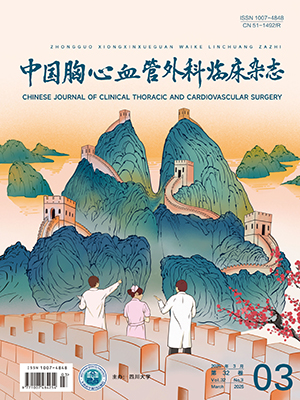| 1. |
Bonow RO, Carabello BA, Chatterjee K, et al.ACC/AHA 2006 guidelines for the management of patients with valvular heart disease:a report of the American College of Cardiology/American Heart Association Task Force on Practice Guidelines (Writing Committee to Develop Guidelines for the Management of Patients With Valvular Heart Disease).Circulation, 2006, 114(5):e84-e231.
|
| 2. |
Bonow RO, Nikas D, Elefteriades JA.Valve replacement for regurgitant lesions of the aortic or mitral valve in advanced left ventricular dysfunction.Cardiol Clin, 1995, 13(1):73-85.
|
| 3. |
Chaliki HP, Mohty D, Avierinos JF, et al.Outcomes after aortic valve replacement in patients with severe aortic regurgitation and markedly reduced left ventricular function.Circulation, 2002, 106(21):2687-2693.
|
| 4. |
Chukwuemeka A, Rao V, Armstrong S, et al.Aortic valve replacement:a safe and durable option in patients with impaired left ventricular systolic function.Eur J Cardiothorac Surg, 2006, 29(2):133-138.
|
| 5. |
Iung B, Baron G, Butchart EG, et al.A prospective survey of patients with valvular heart disease in Europe:the Euro Heart Survey on valvular heart disease.Eur Heart J, 2003, 24(13):1231-1243.
|
| 6. |
Cohn PF, Gorlin R, Cohn LH, et al.Left ventricular ejection fraction as a prognostic guide in surgical treatment of coronary and valvular heart disease.Am J Cardiol, 1974, 34(2):136-141.
|
| 7. |
Forman R, Firth BG, Barnard MS.Prognostic significance of preoperative left ventricular ejection fraction and valve lesion in patients with aortic valve replacement.Am J Cardiol, 1980, 45(6):1120-1125.
|
| 8. |
Greves J, Rahimtoola SH, McAnulty JH, et al.Preoperative criteria predictive of late survival following valve replacement for severe aortic regurgitation.Am Heart J, 1981, 101(3):300-308.
|
| 9. |
Bonow RO, Picone AL, McIntosh CL, et al.Survival and functional results after valve replacement for aortic regurgitation from 1976 to 1983:impact of preoperative left ventricular function.Circulation, 1985, 72(6):1244-1256.
|
| 10. |
Michel PL, Iung B, Abou Jaoude S, et al.The effect of left ventricular systolic function on long term survival in mitral and aortic regurgitation.J Heart Valve Dis, 1995, 4(Suppl 2):S160-S168.
|
| 11. |
Stone PH, Clark RD, Goldschlager N, et al.Determinants of prognosis of patients with aortic regurgitation who undergo aortic valve replacement.J Am Coll Cardiol, 1984, 3(5):1118-1126.
|
| 12. |
Sheiban I, Trevi GP, Casarotto D, et al.Aortic valve replacement in patients with aortic incompetence:preoperative parameters influencing long-term results.Z Kardiol, 1986, 75(Suppl 2):146-154.
|
| 13. |
Paul S, Mihaljevic T, Rawn JD, et al.Aortic valve replacement in patients with severely reduced left ventricular function.Cardiology, 2004, 101(1-3):7-14.
|
| 14. |
Zoghbi WA, Enriquez-Sarano M, Foster E, et al.Recommendation for evaluation of the severity of native valvular regurgitation with two-dimensional and Doppler echocardiography.J Am Soc Echocardiogr, 2003, 16(7):777-802.
|
| 15. |
Schiller NB, Shah PM, Crawford M, et al.Recommendations for quantitation of the left ventricle by two-dimensional echocardio-graphy.J Am Soc Echocardiogr, 1989, 2(5):358-367.
|
| 16. |
Rosenbaum P, Rubin DB.The central role of the propensity score in observational studies for causal effects.Biometrika, 1983, 70(1):41-55.
|
| 17. |
D'Agastino RB Jr.Propensity score methods for bias reduction in the comparison of a treatment group to a nonrandomized control group.Stat Med, 1998, 17(19):2265-2281.
|
| 18. |
Kouchoukos NT, Blackstone EH, Hanley FL, et al.Kirklin/barratt-boyes cardiac surgery.4th ed.Philadelphia:Churchill Livingstone, 2013.543-643.
|
| 19. |
Basraon J, Chandrashekhar YS, John R, et al.Comparison of risk scores to estimate perioperative mortality in aortic valve replace-ment surgery.Ann Thorac Surg, 2011, 92(2):535-540.
|
| 20. |
Imasaka K, Tomita Y, Tanoue Y, et al.Early mitral valve surgery for chronic severe mitral regurgitation optimizes left ventricular performance and left ventricular mass regression.J Thorac Cardiovasc Surg, 2013, 146(1):61-69.
|
| 21. |
Tanoue Y, Oishi Y, Sonoda H, et al.Left ventricular performance after aortic valve replacement in patients with low ejection fraction.J Artif Organs, 2013, 16(4):443-450.
|




